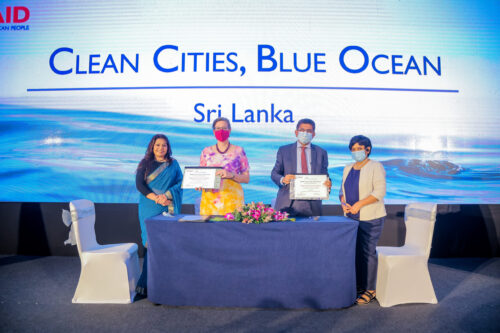USAID’s Clean Cities, Blue Ocean Program Launches Grants in Sri Lanka to Support National Government’s Circular Economy Initiatives

In celebration of Earth Day 2021, USAID’s flagship program to address ocean plastic pollution, Clean Cities, Blue Ocean (CCBO), formally launched its local program in Sri Lanka and announced the award of its first in-country grants to support the nation’s journey to plastic pollution-free cities and seas.
CCBO awarded an initial ~$390,000 in grant funds to two Sri Lankan organizations that will work with local and national government, members of the private sector, and community members to establish new models for sustainable, circular economies. CCBO’s first wave of Sri Lankan grantees includes the Public Interest Law Foundation (PILF) and the Ceylon Chamber of Commerce (CCC) who are working across the nation toward effective governance of solid waste management (SWM) and the recycling sector, and to enhance extended producer responsibility of the private sector through public-private partnerships, respectively.
The April 2021 launch event featured remarks by U.S. Ambassador, Alaina Teplitz, and Sri Lanka’s Secretary of the Ministry of Environment, Mr. Anil Jasingha. To learn more, we invite you to watch the recap of the event and read more about each of CCBO’s grantees, below.
Meet CCBO’s Newest Grantees:
Ceylon Chamber of Commerce (CCC)
- Project: Enhancing Extended Producer Responsibility of Private Sector through a PPP Approach
- Location: Sri Lanka (national)
The Ceylon Chamber of Commerce will also support national-level efforts toward enhanced plastic waste management and private sector engagement in developing sustainable, policy-backed solutions to combat ocean plastics. With its CCBO grant, CCC will forge public-private partnerships to increase collection and recycling of ubiquitous polyethylene terephthalate (PET) and high impact polystyrene (HIPS). Building on the foundation laid under MWRP, CCC seeks to pilot key voluntary components of an EPR Roadmap to develop supporting governance mechanisms and operating systems and engage with informal waste collectors and youth to improve and create innovative, market-based collection and recycling schemes. CCC will also design and operationalize an online Plastic Use Reporting System to increase transparency, establish targets for participating producers, and effectively monitor and measure the impacts of data-driven policy and decision making.
Public Interest Law Foundation (PILF)
- Project: Towards Effective Governance of SWM and the Recycling Sector
- Location: Sri Lanka (national)
Public Interest Law Foundation will provide support to strengthen national-level plastic waste regulations and management frameworks, including support to Sri Lanka’s movement toward Extended Producer Responsibility (EPR). Specifically, CCBO will support PILF to strengthen the legal framework for managing plastic waste, improve local authorities’ capacity and implementation abilities, propose enhanced regulations for EPR on prioritized plastics, and develop management guidelines for non-hazardous/non-infectious hospital plastic and polythene waste. These focus areas build on PILF’s previous work under the USAID Municipal Waste Recycling Program (MWRP), in which it carried out a comprehensive review and assessment of the existing legal and regulatory frameworks on plastic use and waste management in Sri Lanka and provided legal awareness workshops to Local Authorities (LA) in the Western and Southern Provinces.
Learn more about the grants in this video overview:

